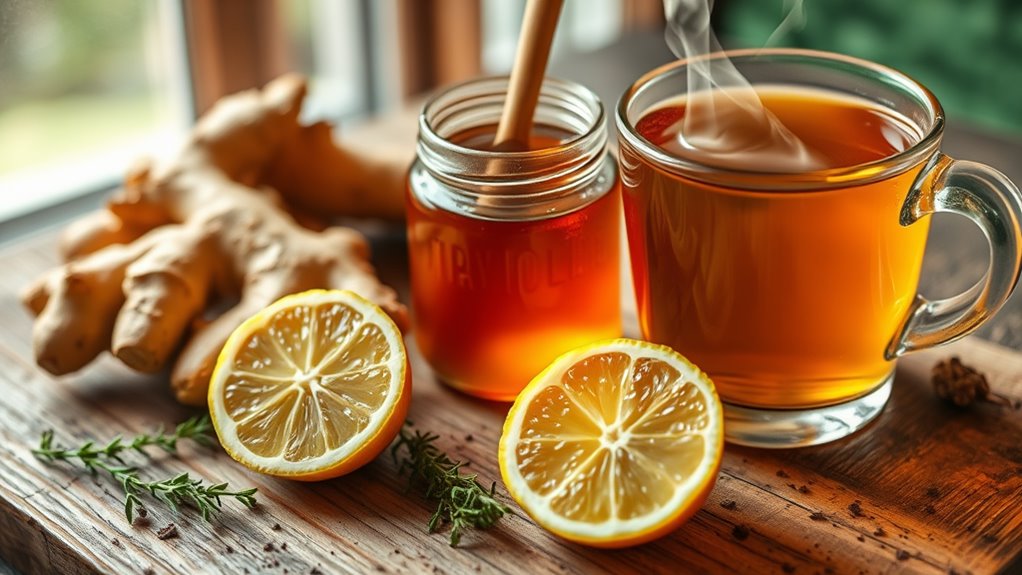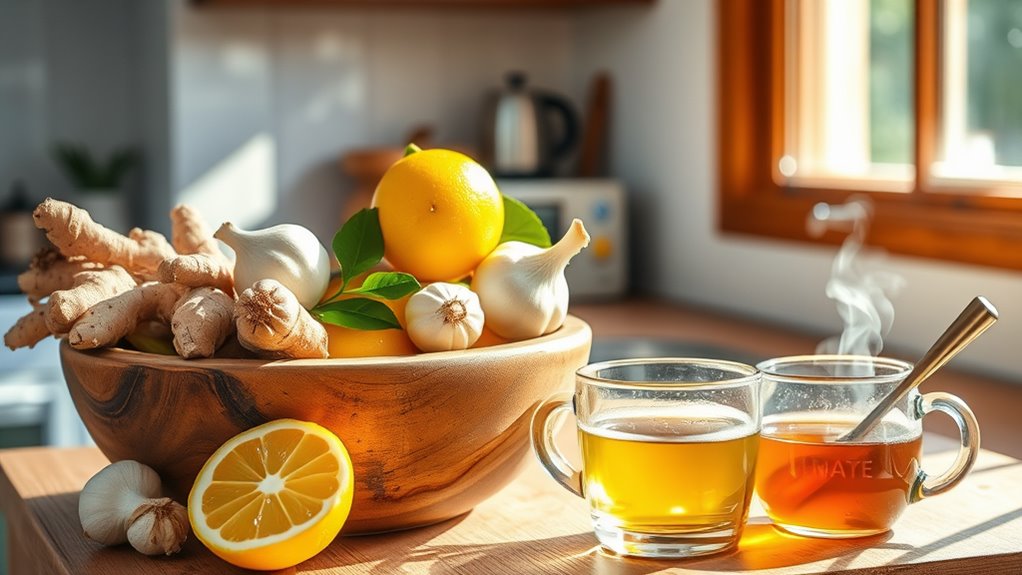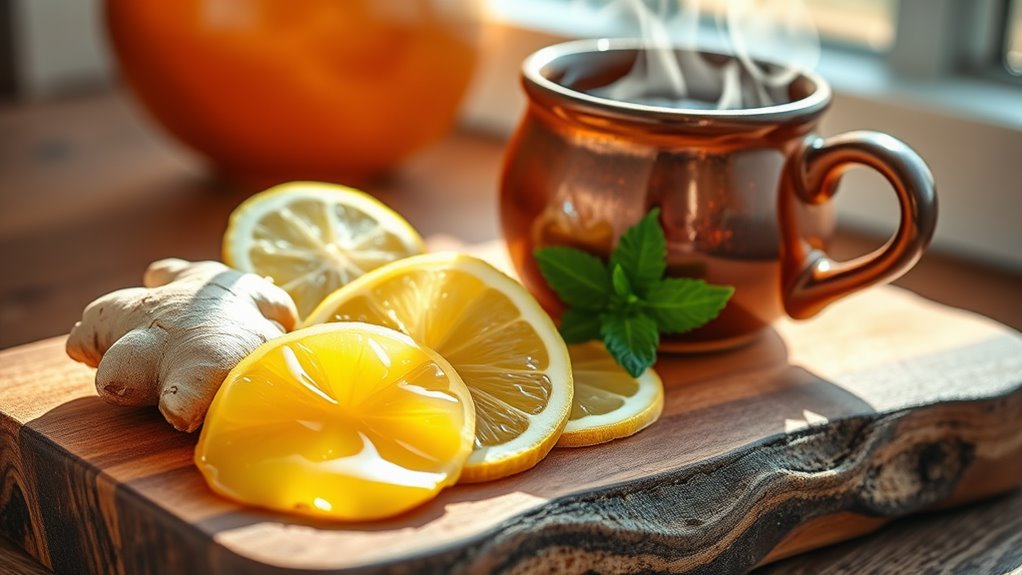How to Soothe Cold Symptoms With Natural Remedies
You can soothe cold symptoms naturally by using herbal teas, essential oils, and smart dietary choices. Sip on chamomile and ginger tea for throat relief and immune support, adding honey and lemon for extra benefits. Eucalyptus and peppermint oils can open airways and relieve sinus pressure; try diffusing or applying them with a carrier oil. Stay hydrated by drinking plenty of fluids, especially warm broths. Focus on nutrient-rich foods and get enough sleep to aid recovery. Managing stress is also vital. Discover more effective strategies to ease those pesky cold symptoms.
Key Takeaways
- Sip chamomile or ginger tea with honey and lemon to soothe sore throats and alleviate nausea while boosting immunity.
- Use eucalyptus or peppermint essential oils for inhalation to relieve nasal congestion and headaches effectively.
- Stay hydrated by drinking at least eight glasses of fluids daily to thin mucus and keep your throat moist.
- Incorporate immune-boosting foods like fruits, vegetables, and lean proteins into your diet for better recovery.
- Prioritize sleep hygiene and practice stress management techniques to support your immune function during illness.
Herbal Teas for Relief
When you’re feeling under the weather, a steaming cup of herbal tea can be a comforting remedy for cold symptoms. Two great options are chamomile tea and ginger tea, both known for their soothing properties.
Chamomile tea helps you relax, making it easier to get the rest your body needs. Its anti-inflammatory properties can help ease a sore throat and reduce congestion, providing much-needed relief.
On the other hand, ginger tea packs a punch with its warming qualities. Ginger is known for its ability to boost your immune system and fight off infections. It can help alleviate nausea and soothe an upset stomach, which sometimes accompanies cold symptoms.
Plus, the warmth of ginger tea can help clear nasal passages, making it easier to breathe.
To make the most of these herbal teas, try adding honey or lemon for added benefits. Honey can soothe your throat, while lemon provides a dose of vitamin C.
Drinking herbal teas not only hydrates you but also offers a moment of comfort and care during your illness. So, the next time you feel a cold coming on, reach for chamomile or ginger tea for some soothing relief.
Essential Oils Benefits
Alongside herbal teas, essential oils can offer additional support in soothing cold symptoms. These concentrated plant extracts come with powerful aromatic properties that can enhance your comfort during a cold.
For instance, eucalyptus oil can help open up your airways, making it easier to breathe, while peppermint oil may provide an invigorating sensation that can alleviate headaches and sinus pressure.
When you inhale essential oils, their therapeutic effects can promote relaxation and improve your overall sense of well-being. Lavender oil, known for its calming properties, can help you get better rest, which is essential for recovery.
Additionally, tea tree oil’s antimicrobial qualities can support your immune system, aiding in faster healing.
You can use essential oils in various ways, such as diffusing them in your room, adding a few drops to a warm bath, or mixing them with a carrier oil for a soothing massage.
Just remember to dilute them properly to avoid skin irritation. By incorporating essential oils into your routine, you can tap into their natural benefits, making your cold symptoms more manageable while nurturing your body’s healing process.
Dietary Adjustments
Your diet plays an essential role in managing cold symptoms and supporting your recovery. When you’re feeling under the weather, focusing on immune boosting foods can make a significant difference. Incorporate plenty of fruits and vegetables like oranges, spinach, and berries into your meals. These foods are rich in vitamins and antioxidants, which help strengthen your immune system.
Don’t forget about proteins! Lean meats, fish, and legumes provide the necessary nutrients your body needs to fight off the cold. Additionally, whole grains can keep your energy levels steady, allowing you to feel better faster.
Hydration is equally important. Drinking plenty of fluids, such as water, herbal teas, or broths, helps thin mucus and keeps your throat moist, which can alleviate discomfort.
Aim for at least eight glasses a day, but listen to your body—if you feel thirsty, drink more!
Home Remedies to Try
Exploring home remedies can provide comforting relief from cold symptoms and help you recover more quickly. One of the simplest yet effective remedies is steam inhalation. By inhaling steam from hot water, you can ease nasal congestion and soothe irritated airways. Adding a few drops of essential oils like eucalyptus or peppermint can enhance the effect and promote easier breathing.
Another effective remedy is honey. The honey benefits are well-known, as it has natural antimicrobial properties that can help soothe a sore throat and suppress coughing. Mix a tablespoon of honey in warm water or herbal tea for added comfort. You can also try honey with lemon, which not only tastes great but also provides a boost of vitamin C.
Additionally, consider sipping on warm broths or herbal teas, which can help keep you hydrated while providing nutrients. Ginger tea is particularly useful, as ginger has anti-inflammatory properties that can help reduce symptoms.
These home remedies can offer you a sense of relief while your body fights off the cold. Remember, though, if symptoms persist or worsen, it’s always best to consult a healthcare professional.
Lifestyle Changes for Recovery
While home remedies can provide immediate comfort, making certain lifestyle changes can greatly aid your recovery from a cold.
First, prioritize sleep hygiene. Ensuring you get sufficient rest is essential for your immune system to fight off illness. Create a calming bedtime routine, maintain a consistent sleep schedule, and keep your sleep environment cool and dark to enhance your sleep quality.
Next, focus on stress management. High stress levels can weaken your immune response, making it harder for your body to recover. Incorporate relaxation techniques like deep breathing, meditation, or gentle yoga into your daily routine. Even short breaks throughout the day can help alleviate stress and promote a sense of well-being.
Additionally, stay hydrated and nourish your body with wholesome foods rich in vitamins and minerals. Avoiding alcohol and caffeine can also support your recovery process.
Finally, limit your exposure to irritants like smoke or strong fragrances, as these can aggravate your symptoms.
Frequently Asked Questions
Can Children Use Herbal Teas for Cold Symptoms?
Yes, children can use herbal teas for cold symptoms, but guarantee you prioritize child safety. Herbal tea benefits include soothing effects and hydration. Always consult a pediatrician before introducing new remedies to your child’s routine.
Are There Any Essential Oils to Avoid During Pregnancy?
When expecting, it’s crucial to tread carefully. You should avoid essential oils like sage, rosemary, and jasmine, as their potency can raise concerns. Always prioritize essential oil safety and follow pregnancy precautions for peace of mind.
How Long Should I Follow Dietary Adjustments for Cold Recovery?
You should follow dietary modifications for the duration of your cold. Typically, this means sticking to them until symptoms improve substantially, usually about a week. Listen to your body, and adjust as needed for comfort.
Can I Combine Multiple Home Remedies Safely?
You can safely combine multiple home remedies, but be cautious with herbal combinations. Some remedies might have interactions, so it’s wise to research each ingredient and consult a healthcare professional if you’re unsure.
When Should I Seek Medical Attention for Cold Symptoms?
You should seek medical attention if you’re recognizing complications like difficulty breathing, persistent fever, or symptoms lasting longer than ten days. Trust your instincts; it’s always better to err on the side of caution.





